|
The theme of the second day of the 2019 Elimination of Sexual Violence in Conflict Week International Symposium was “Endless Pain: The Prevention of the Crimes of Sexual Violence in Armed Conflicts.” The talks that were given continued to focus on the Japanese Military Sexual Slavery Issue and also looked at the sexual slavery in more recent conflicts in the Democratic Republic of Congo, Kosovo, and with the Lord’s Resistance Army in Uganda. The day began with the introduction of another Japanese military sexual slavery survivor, halmoni Won-ok Gil, who sang a song for the assembled participants and said a few words of greeting.
The keynote speaker of the day was Rashida Manjoo, Professor of Public Law at the University of Cape Town and the former UN Special Rapporteur on Violence against Women. The title of Professor Manjoo’s speech was “United Nations Developments regarding Sexual Violence in Conflict and the Importance of Reparations that are Transformative.” Prof. Manjoo laid out in her talk the prevalence of sexual violence in 20th and 21st century conflicts and then explained what the United Nations is doing about this issue. In April of 2019 the United Nations adopted Resolution 2467, “Women and peace and and security: Sexual violence in conflict.” However, due to objections from member states such as Russia, China, and the United states, draft language which addressed “accountability and a survivor-centered approach” to causes and effects of sexual violence as well as “sexual and reproductive health and rights” were removed from the resolution. Nine times since 2000 the United Nations has adopted resolutions addressing the issue of sexual violence against women during armed conflict and its aftermath. As a result sexual violence in all of its forms is now recognized internationally as a tool of war and a bureaucracy has been set up to track the use of sexual violence in armed conflict, provide a forum to prosecute the perpetrators, and work on the need to offer reparations to the victims. She concluded by stating that while there is now widespread international recognition of sexual violence in conflict as an issue, and that structures exist to address this issue, there is still a great deal of work which needs to bd done before this issue even beignets be addressed properly. The next speaker of the day was Bonane Akim Bugeso, the coordinator of REMED, an organization created to provide support to the women and girls affected by sexual violence in the Democratic Republic of Congo (DRC). Participants were presented with the statistics related to sexual violence in the DRC, and then told about the organization REMED and it’s program “Mama Ushirika” program [ushirika means your problem is my problem in Congolese] which provides support groups for women and girls affected by sexual violence and provides them with school fees for their children, job training, and soon a literacy program. Bonane Akim Bugeso was followed by Jolly Grace Okot Adruville who spoke briefly of her experience being a forced child soldier for the Lord’s Resistance Army in Uganda and being raped by commanders of the army before moving on to her work with various NGOs to help survivors of Lord’s Resistance Army (LRA) sexual violence. She founded a organization called HEALS that provided play therapy for the children who were "night commuters” [night commuters were children sleeping en masse in public bus stops to avoid being kidnapped by the LRA] before going on to start WEND, a socially-responsible fashion company that employs victims of violence in northern Uganda at the hands of the LRA. The women are given training in sewing and tailoring, as well as instruction in personal health and finance, before being employed by WEND in sewing bags and toys for WEND’s product line. They are employed at a living wage and so are able to care for their families and send their children to school. The next speaker was Ms. Sylvia Acan, who in 2018 was the first recipient of the Kim Bok-don Peace Prize, and a survivor of sexual violence at the hands of the LRA, who eagerly told the audience about her organization - Golden Women Vision in Uganda, which uses group meetings to help Northern Uganda’s sexual violence survivors to talk through their experiences, learn skills that will allow them to set up their own small businesses, and provide micro loans to finance those same small businesses. All of the outside funds that Golden Women Vision in Uganda receives comes from the Butterfly Fund, a fund established by the first two survivors of Japanese Military Sexual Slavery to come forward, Kim Bok-dong and Gil Won-ok. The Butterfly Fund distributes funds to help other wartime rape survivors across the globe. Ms. Acan mentioned that while the Ugandan government has pledged to help survivors to rebuild their lives little has been done in the 24 years since that pledge was made. Ms. Acan was followed by Rose Aber, the third survivor of Lord’s Resistance Army sexual violence to address the symposium. Ms. Aber told the group about the micro loan program, Can Rewede Pee, for which she is treasurer. The group, with the help of outside finance from the Butterfly Fund, has been able to help the members set up their own small businesses which has allowed all of them to keep their children in school and also set up a hospitalization fund to pay the hospital expenses should any of their members be hospitalized. The most pressing need for group members turned out to be access to housing. In Uganda social mores make it difficult to rent housing if you have children but not a husband - all of the women have two or more children born to them from the sexual violence they experienced at the hands of the LRA. The Can Rewede Pee fund hopes to amass enough funds to help members build their own homes so that they are no longer at the mercy of landlords. After Ms. Acan’s talk the focus shifted away from the work being done in Africa and turned to Kosovo, where the 2019 recipient of the Kim Bok-don Peace Prize, Vasfijie Krasniqi-Goodman told her story about being raped at the hands of a soldier and a civilian during the Kosovo war, and the ordeal she has endured being the only victim of sexual violence from that conflict who has been willing to speak publicly though scores of women have come forward privately and told her their own experiences, and it is estimated that the victims number at twenty thousand. Ms. Krasniqi-Goodman is working for justice both for herself and for other victims through the international court system, which has currently not brought her perpetrators to justice, as being an activist for the Kosova Rehabilitation Center for Torture Victims (KRCT), which advocates for wartime victims of sexual violence across the globe. Lastly the symposium returned to Korea to look at what had been done both in terms of government recognition, reparations for victims, and education of the rising generation. Telling the audience that “the war is over but the war is still not over for the victims,” Yoon Meehyang recounted all the activism that had gone on in Korea since the first victims spoke out, Ms. Yoon mentioned both the progress that had been made as well as the setbacks. Regardless of the setbacks, and the fact that sexual violence still plagues women caught up in military conflicts across the globe, Ms. Yoon emphasized that there was still hope that more progress would be made and victims would get their reparations.
0 Comments
Leave a Reply. |
CategoriesCategories |
Proudly powered by Weebly
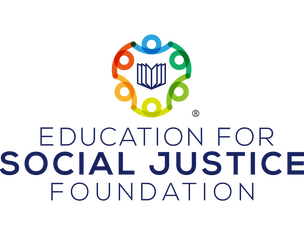
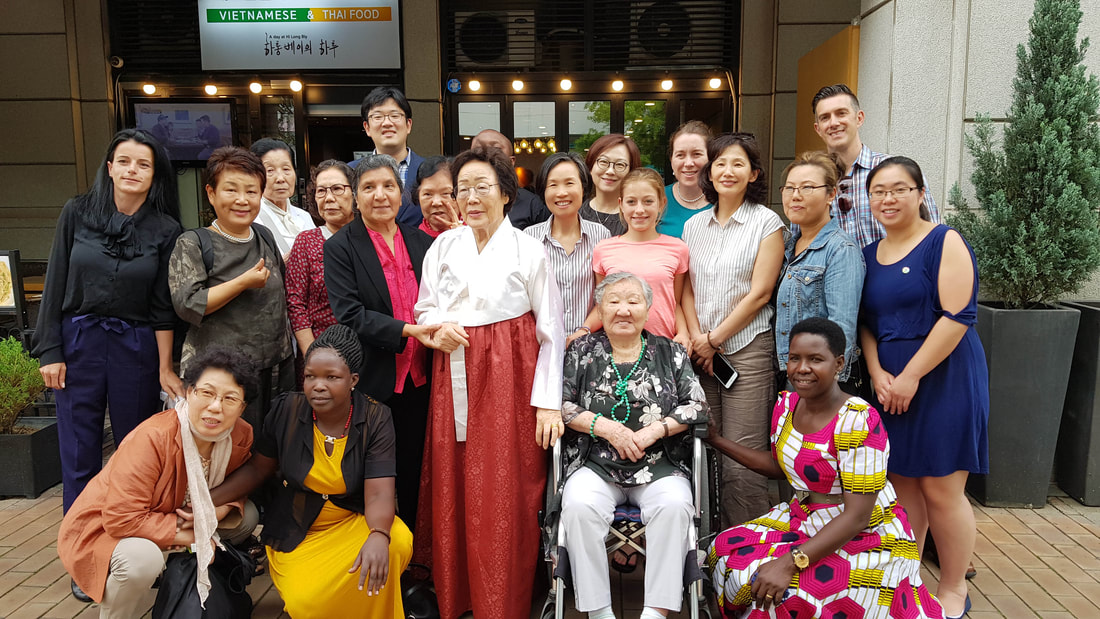
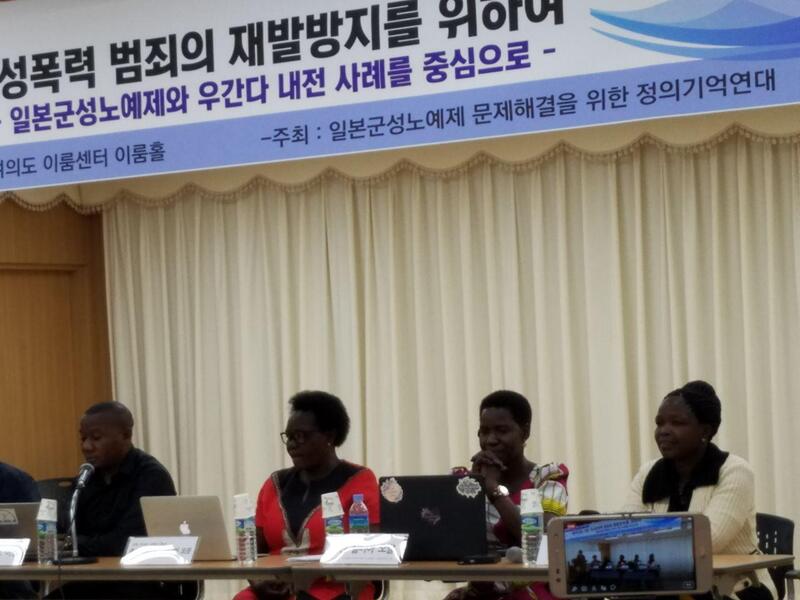
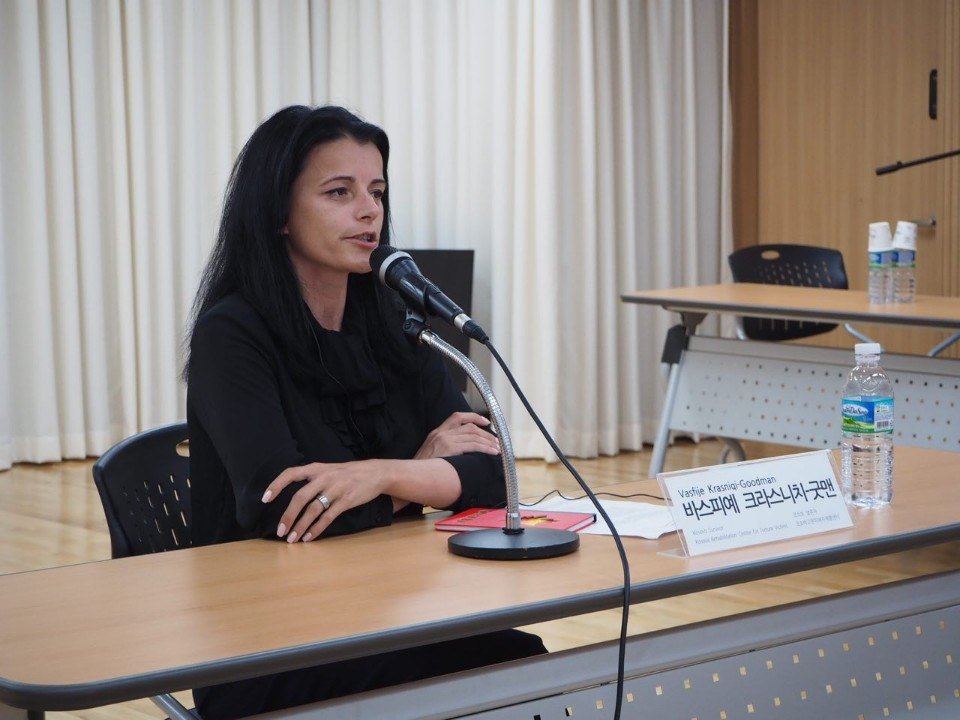
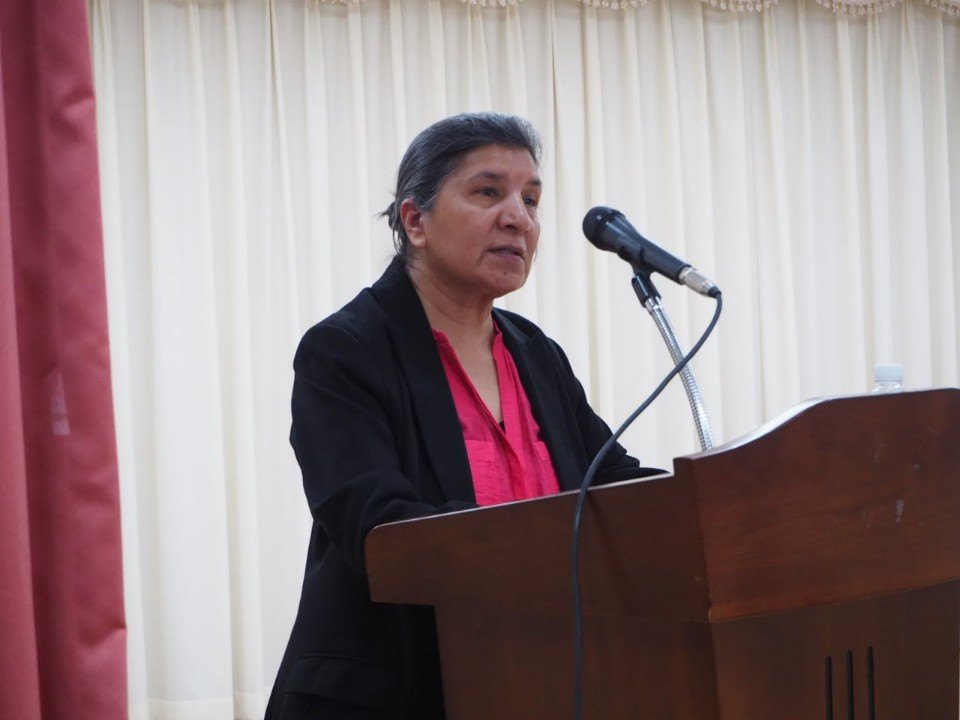
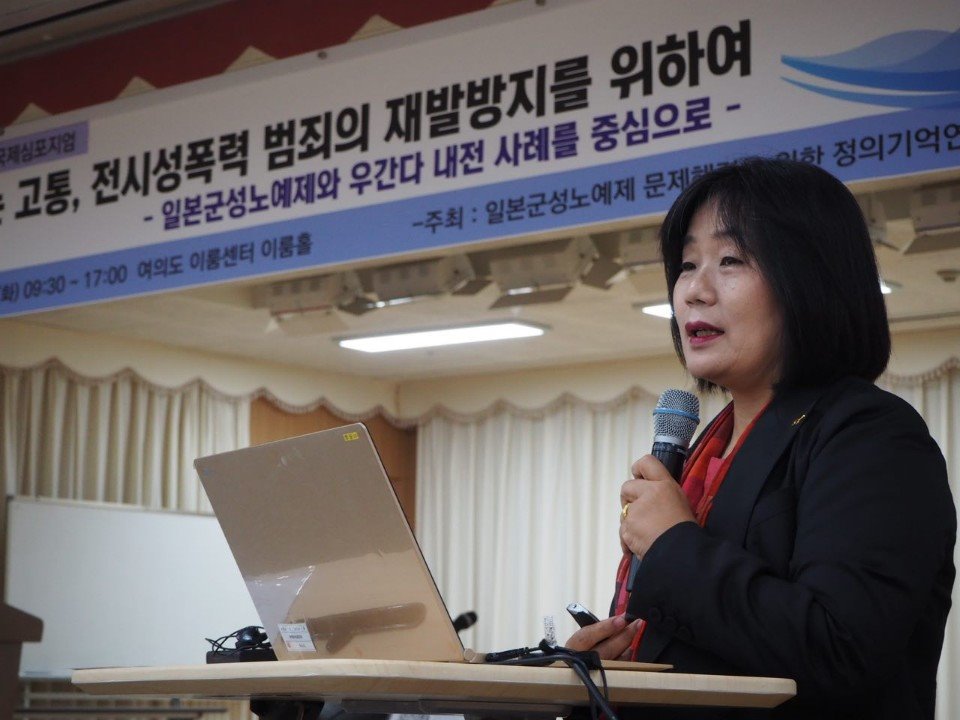
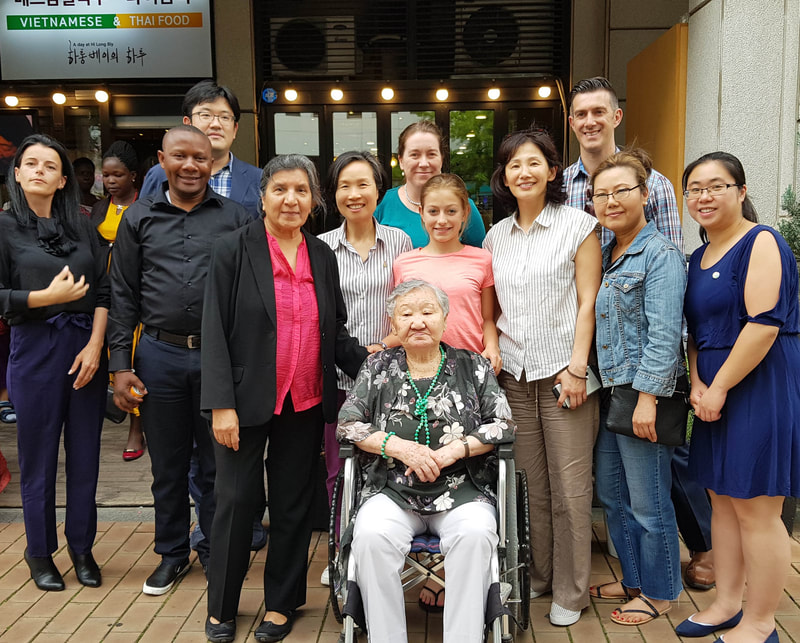
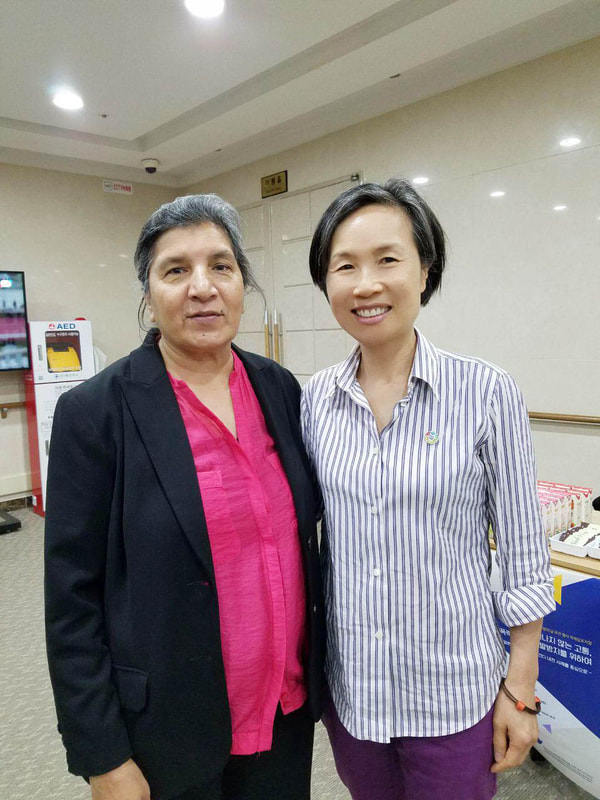
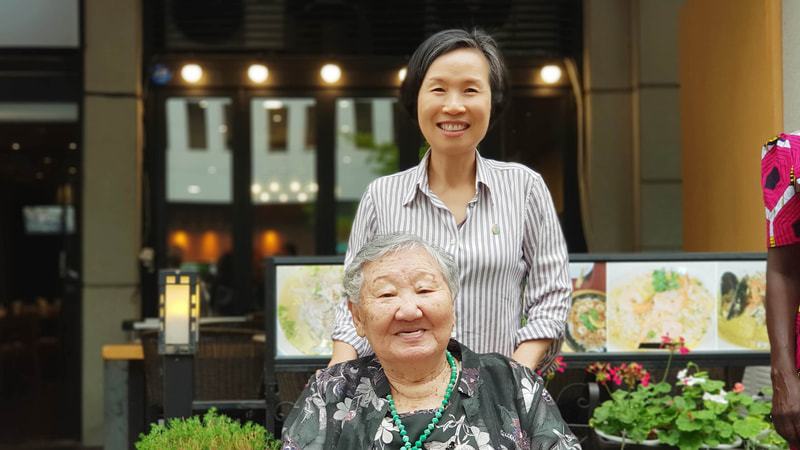
 RSS Feed
RSS Feed